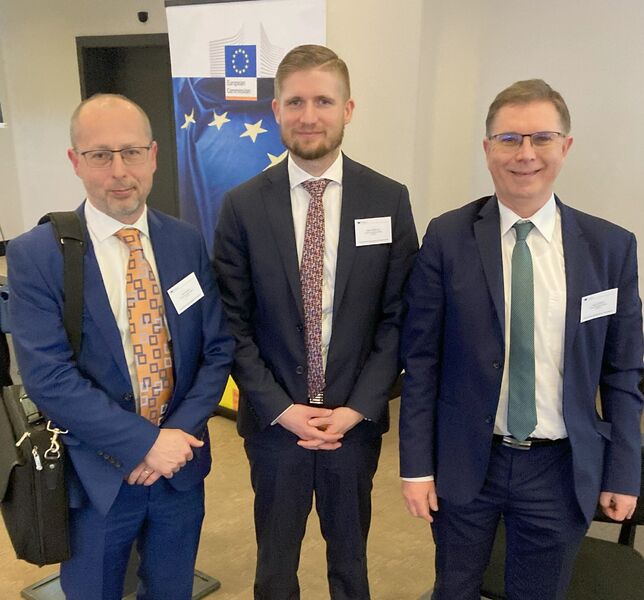
The Financial Instruments workshop
Bratislava / Prague, February 29, 2024 - The Financial Instruments workshop taking place last week in Prague, brought together the colleagues from the managing authorities of CZ and SK programmes, the FI practitioners from consultancy companies, banks, but also the regional representatives. The workshop provided a platform for exchange on the main topics related to the implementation of FI in the EU funds under shared management in Czechia and Slovakia, all being done within 3 working session.
1. Stock-taking: implementation of financial instruments in the 2014-2020 programming period
Peter Dittrich (Vice-Chairman, Slovak Investment Holding) presented the organizational set-up for the FI implementation in SR, describing the areas concerned as well as the specific FIs. He explained the management of EUR 1.3 billion from EU resources under the shared management under the supervision of SIH.
Martin Spiritza (Director, Ministry of Finance of the Slovak Republic) presented the creation of centralised model for the implementation of FI, the role of the Slovak Ministry of Finance as well as of SIH, relating to their structure, yet also highlighting the difference between programming periods in Czechia and Slovakia.
2. The way forward: best practices
Peter Fröhlich (Chairman, Slovak Investment Holding) explained the work of SIH, presented the strategy for the new MFF, described the National Development Fund III and the use of FI combined with grants.
Jonathan Denness (Head of Unit, Financial Instruments, DG REGIO, EC) provided the audience with an overview of the outcomes from the use of FI in the 2014-2020 period. The novelties in the Common Provisions Regulation (CPR) were equally outlined. Practical examples from other EU MS were provided to inspire Czech and Slovak stakeholders.
Robert Pernetta (Fund and structuring officer, European Investment Bank) presented examples that successfully implement energy efficiency projects through FIs and described their specificities.
3. Interactive session
Panel discussion 1: What are the operational bottlenecks in implementing financial instruments in this programming period?
Peter Fröhlich (Chairman, Slovak Investment Holding) depicted the situation form the point of view of SIH when talking about the delays in the new State aid rule, difficulty in the combination of grants and FI, or the unequal playing field with the EIB.
Panelists: Jan Fiala (Managing Director of Lahůdky Fiala), Milan Orlovský (Co-founder & CEO of KOOR), Petr Procházka (Sustainable finance and European agenda advisor, Czech Banking Association).
Panel discussion 2: Are there any success stories or elements to replicate?
Miloš Ješko (CFO & Board Member, Slovak Investment Holding) outlined the experience with projects implemented by SIH (SIHAZ, D4R7 highway quasi-equity financing, or Dostupny Domov).
Panelists: Dijana Bezjak (Head of Service for Financial Instruments, Ministry of Regional Development and EU Funds, Republic of Croatia), Ondřej Ptáček (Director for public sector, Price Waterhouse Cooper), Petr Zahradník (Economist, Member of the National Economic Council of the Czech Government, Adviser to the European Economic and Social Committee).
In his concluding remarks Pascal Boijmans (Head of Unit, Czech Republic and Slovakia, DG Regio, European Commission) summarized the main topics discussed:
The added value of financial instruments (FIs)
- FIs should be default option for income generating and cost saving projects as the reflows can be used for future investments.
- The use of FIs in Cohesion Policy funds has significant leverage effect attracting the private investments in FIs;
- EUR 15.8 billion of ERDF and CF let to EUR 60.7 billion EUR financing mobilized,
- On average, each euro paid to final recipients or set aside for guaranteed loans generated 3.8 times financing.
- Combination with grant in one FI operation could reach final recipients that otherwise cannot be reached and facilitate the support of less traditional sectors besides the established areas (SMEs and energy).
- A solid ex-ante assessment for FIs is important and helps to the implementation. In remains to be a form of market research and not the purpose itself.
How to make the financial instruments attractive?
- The competition with grants in the same area must be avoided.
- FIs should be business friendly – faster and easier to use than grants (less red tape).
- FIs need to be cheap for final recipient.
- Built-in incentives for intermediaries and final recipients – design that motivates to apply FIs.
What is advisable in FIs governance?
- Central body to coordinate FI’s serving as the competence centre is crucial à SIH (in SK), NDB (in CZ).
- Anchor its role by law (NDB) or decree (SK).
- EC should simplify the conditions of state aid.
